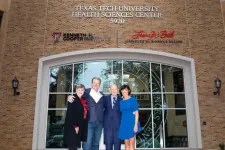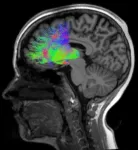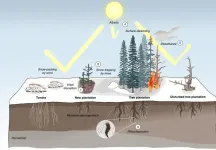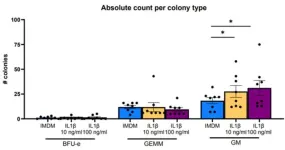(Press-News.org) Researchers Identify Reduction in Heart Failure-Related Risk Factors following Metabolic Surgery
Recent study suggests that metabolic surgery for patients with heart failure can reduce dependency on oral diuretics, which are used to manage heart failure symptoms
FOR IMMEDIATE RELEASE
November 7, 2024
BATON ROUGE – Pennington Biomedical Research Center researchers at the Metamor Institute, along with colleagues from Our Lady of the Lake and LSU Health-New Orleans, have recently determined that metabolic surgery on patients with heart failure can result in a reduction in the need for oral diuretics, which are used to manage symptoms such as venous and vascular pressures. The researchers explain their processes and further elaborated on their findings in the recent study “Clinical Outcomes of Metabolic Surgery on Diuretic Use in Patients with Heart Failure.”
While obesity is widely recognized as a co-morbidity of heart failure, strong evidence suggests that obesity is a leading cause of the condition. The authors hypothesized that metabolic surgery may reduce recurrence of heart failure symptoms. Researchers reviewed more than 2,300 hospital records of patients who underwent metabolic surgery between 2017 and 2023 and identified 63 of those patients with a diagnosis of heart failure prior to surgery.
“The data unearthed in our study further expands the extended benefits of metabolic surgery, including for those with heart failure and heart disease,” said Dr. Philip Schauer, Director of the Metamor Institute, located on the campus of Pennington Biomedical Research Center in Baton Rouge, and one of the researchers on the study. “With obesity as a commonly occurring factor in heart failure, the reduction in the use of diuretics following metabolic surgery aligns with similar studies on improvements in post-surgery quality of life. The Metamor Institute and Pennington Biomedical investigative teams are pleased to undertake research that provides further clarity into the benefits of obesity interventions.”
The data in the study showed that for patients with heart failure who underwent metabolic surgery, patients saw a mean weight loss of 29 percent 24 months after the surgery. Furthermore, the weight loss was accompanied by a 65 percent decrease in diuretic use at 24 months after surgery.
“With the high incidence of heart failure and obesity in South Louisiana ongoing research like this is vital to stem the consequences of these diseases and improve the quality of life for our patients.” said Dr. Denzil Moraes, FACC and Chief Medical Director of the Heart and Vascular Institute at Our Lady of the Lake Regional Medical Center and co-lead author of the study.
Researchers relied on the use or disuse of diuretics as markers of whether or not the patients with a history of heart failure continued to use the diuretics to treat heart failure induced water build up. Diuretics, also known as “water pills,” are used to enhance kidney function and aid the organ in its role of ridding the body of unneeded water and salt. The removal of this water and salt makes it easier for the heart to pump. As heart failure is associated with high blood pressure, swelling and water build up, diuretics are frequently prescribed to mitigate these issues.
“While there are obvious benefits to metabolic intervention, I am proud that our team continues to affirm the safety of metabolic surgery, elaborate on its effectiveness and add to the long list of benefits such interventions provide,” said Dr. John Kirwan, Executive Director of Pennington Biomedical. “It is research like this that sets Metamor apart and positions the Institute as a leader in the advanced treatment of obesity and diabetes.”
Established in late 2019, the Metamor Institute is a partnership among Pennington Biomedical Research Center, Our Lady of the Lake Regional Medical Center, the Office of the Governor of Louisiana, Louisiana Economic Development, LSU Health New Orleans School of Medicine, and the Pennington Biomedical Research Foundation. The institute is uniquely focused on the treatment of obesity and diabetes. It is the first institute in the nation to offer an integrated and multidisciplinary approach to caring for those suffering from obesity, diabetes and their related diseases in one facility.
About the Pennington Biomedical Research Center
The Pennington Biomedical Research Center is at the forefront of medical discovery as it relates to understanding the triggers of obesity, diabetes, cardiovascular disease, cancer and dementia. The Center conducts basic, clinical, and population research, and is a campus of the LSU System.
The research enterprise at Pennington Biomedical includes over 530 employees within a network of 44 clinics and research laboratories, and 13 highly specialized core service facilities. Its scientists and physician/scientists are supported by research trainees, lab technicians, nurses, dietitians, and other support personnel. Pennington Biomedical is a state-of-the-art research facility on a 222-acre campus in Baton Rouge.
For more information, see www.pbrc.edu.
-30-
Media Contacts:
Joe Coussan
Pennington Biomedical Research Center
225-763-3049
Joe.coussan@pbrc.edu
Ernie Ballard
Pennington Biomedical Research Center
225-763-2677
Ernie.ballard@pbrc.edu
END
Researchers identify reduction in heart failure-related risk factors following metabolic surgery
Recent study suggests that metabolic surgery for patients with heart failure can reduce dependency on oral diuretics, which are used to manage heart failure symptoms
2024-11-07
ELSE PRESS RELEASES FROM THIS DATE:
The Kenneth H. Cooper Institute at Texas Tech University Health Sciences Center unveiled in Dallas
2024-11-07
For more than 50 years, as a leading pioneer of preventive medicine and the “father of aerobics,” Kenneth H. Cooper, M.D., has revolutionized health and fitness worldwide. Similarly, the Texas Tech University Health Sciences Center (TTUHSC) has long been dedicated to education, patient care and research. Today (Nov. 4) TTUHSC officially welcomed The Cooper Institute as part of its organization with a special presentation and unveiling of its new name – the Kenneth H. Cooper Institute at Texas Tech University Health Sciences Center.
The Cooper ...
DNA evidence rewrites story of people buried in Pompeii eruption
2024-11-07
In 79 AD, Mount Vesuvius experienced one of its most significant eruptions, burying the Roman city of Pompeii and its inhabitants under a thick layer of small stones and ash known as lapilli. Many of Pompeii's inhabitants lost their lives as their homes collapsed under the weight of the lapilli raining down from many kilometres above. Those who survived the initial phase of the eruption eventually succumbed to the dangerous pyroclastic flows. This fast-moving stream of hot gas and volcanic matter instantly enveloped their bodies in a solid layer of ash, effectively preserving their bodies, including their features.
Since the 1800s, casts had been made by pouring plaster into the ...
DNA evidence rewrites histories for people buried in volcanic eruption in ancient Pompeii
2024-11-07
In 79 CE, the active volcanic system in southern Italy known as Somma-Vesuvius erupted, burying the small Roman town of Pompeii and everyone in it. The “Pompeii eruption” covered everything in a layer of ash that preserved many of the bodies. Now, ancient DNA collected from the famed body casts alters the history that’s been written since the once forgotten town’s rediscovery in the 1700s. As reported on November 7, 2024, in Current Biology, the DNA evidence shows that individuals’ sexes and family relationships don’t match ...
People with schizophrenia show distinct brain activity when faced with conflicting information
2024-11-07
Scientists have known for decades that the classic symptoms of schizophrenia, such as jumping to conclusions or difficulty adjusting to new information, can be attributed to poor communication between the cerebral cortex and the thalamus, known as the brain’s central switchboard. By measuring brain cell activity between these two regions as volunteers completed ambiguous tasks, a team of Tufts University School of Medicine and Vanderbilt University School of Medicine researchers found a way to use someone’s sensitivity to uncertainty as a diagnostic tool.
In a study published November 7 in the journal ...
Climate change: Significant increase in carbon dioxide emissions from private aviation
2024-11-07
Annual emissions of carbon dioxide (CO2) from private aviation increased by 46% between 2019 and 2023, according to an analysis published in Communications Earth & Environment. The results also show that some individuals who regularly use private aviation may produce almost 500 times more CO2 in a year than the average individual, and that there were significant emissions peaks around certain international events, including COP 28 and the 2022 FIFA World Cup.
Private aviation is highly energy-intensive, emitting significantly more CO2 per passenger than commercial flights, but is used by approximately 0.003% ...
Planting trees in the Arctic could make global warming worse, not better, say scientists
2024-11-07
Tree planting has been widely touted as a cost-effective way of reducing global warming, due to trees’ ability to store large quantities of carbon from the atmosphere. But, writing in the journal Nature Geoscience, an international group of scientists argue that tree planting at high latitudes will accelerate, rather than decelerate, global warming.
As the climate continues to warm, trees can be planted further and further north, and large-scale tree-planting projects in the Arctic have been championed by governments and ...
Finding function for noncoding RNAs using a new kind of CRISPR
2024-11-07
Genes contain instructions for making proteins, and a central dogma of biology is that this information flows from DNA to RNA to proteins. But only two percent of the human genome actually encodes proteins; the function of the remaining 98 percent remains largely unknown.
One pressing problem in human genetics is to understand what these regions of the genome do—if anything at all. Historically, some have even referred to these regions as “junk.”
Now, a new study in Cell finds that some noncoding RNAs are not, in fact, junk—they are functional and play an important role in our cells, including in cancer and human development. Using CRISPR technology that ...
Neurodevelopment in the first 2 years of life following prenatal exposure to maternal SARS-CoV-2 Infection
2024-11-07
About The Study: In this longitudinal cohort study of multiple aspects of child neurodevelopment between ages 6 and 24 months, negligible associations between prenatal exposure to SARS-CoV-2 infection and child outcomes were observed. Follow-up research is warranted to determine whether these predominantly null effects persist into later childhood.
Corresponding Author: To contact the corresponding author, Gerald F. Giesbrecht, PhD, email ggiesbre@ucalgary.ca.
To access the embargoed study: Visit our For The Media website at this link https://media.jamanetwork.com/
(doi:10.1001/jamanetworkopen.2024.43697)
Editor’s ...
Racial disparities in genetic detection rates for inherited retinal diseases
2024-11-07
About The Study: Results from this study highlight a lower genetic detection rate for Black patients than for white patients with inherited retinal diseases. This supports a concern that the current development of inherited retinal disease therapeutics is highly dependent on the ability to identify the genetic cause of disease.
Corresponding Author: To contact the corresponding author, K. Thiran Jayasundera, M.D., email thiran@med.umich.edu.
To access the embargoed study: Visit our For The Media website at this link https://media.jamanetwork.com/
(doi:10.1001/jamaophthalmol.2024.4696)
Editor’s Note: Please see the article for additional information, including ...
Stem cells shed insight into cardiovascular disease processes
2024-11-07
When thinking about the immune system, most people think about B and T cells and how they can be trained to recognize pathogens, preventing re-infections. Besides this “adaptive” immune system, we also have an “innate” immune system which acts as first line defense against e.g. bacteria and viruses. The textbook view is that the innate immune system is non-specific so that it’s response always follows the same pattern, even for recurring infections. However, research published today in Stem Cell Reports provides evidence ...
LAST 30 PRESS RELEASES:
Justice after trauma? Race, red tape keep sexual assault victims from compensation
Columbia researchers awarded ARPA-H funding to speed diagnosis of lymphatic disorders
James R. Downing, MD, to step down as president and CEO of St. Jude Children’s Research Hospital in late 2026
A remote-controlled CAR-T for safer immunotherapy
UT College of Veterinary Medicine dean elected Fellow of the American Academy of Microbiology
AERA selects 34 exemplary scholars as 2026 Fellows
Similar kinases play distinct roles in the brain
New research takes first step toward advance warnings of space weather
Scientists unlock a massive new ‘color palette’ for biomedical research by synthesizing non-natural amino acids
Brain cells drive endurance gains after exercise
Same-day hospital discharge is safe in selected patients after TAVI
Why do people living at high altitudes have better glucose control? The answer was in plain sight
Red blood cells soak up sugar at high altitude, protecting against diabetes
A new electrolyte points to stronger, safer batteries
Environment: Atmospheric pollution directly linked to rocket re-entry
Targeted radiation therapy improves quality of life outcomes for patients with multiple brain metastases
Cardiovascular events in women with prior cervical high-grade squamous intraepithelial lesion
Transplantation and employment earnings in kidney transplant recipients
Brain organoids can be trained to solve a goal-directed task
Treatment can protect extremely premature babies from lung disease
Roberto Morandotti wins prestigious Max Born Award for pioneering research in quantum photonics
Scientists map brain's blood pressure control center
Acute coronary events registry provides insights into sex-specific differences
Bar-Ilan University and NVIDIA researchers improve AI’s ability to understand spatial instructions
New single-cell transcriptomic clock reveals intrinsic and systemic T cell aging in COVID-19 and HIV
Smaller fish and changing food webs – even where species numbers stay the same
Missed opportunity to protect pregnant women and newborns: Study shows low vaccination rates among expectant mothers in Norway against COVID-19 and influenza
Emotional memory region of aged brain is sensitive to processed foods
Neighborhood factors may lead to increased COPD-related emergency department visits, hospitalizations
Food insecurity impacts employees’ productivity
[Press-News.org] Researchers identify reduction in heart failure-related risk factors following metabolic surgeryRecent study suggests that metabolic surgery for patients with heart failure can reduce dependency on oral diuretics, which are used to manage heart failure symptoms





